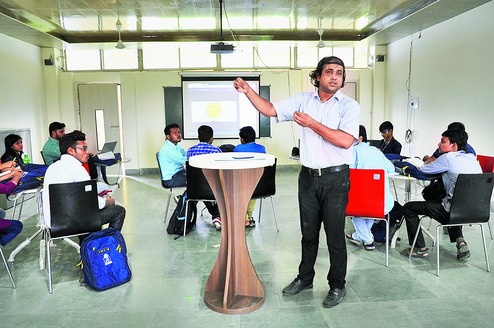
Sept. 6: A private engineering college in Kalyani has discarded conventional teaching and evaluation for a method called "flipped learning" that converts classrooms into smart workshops and studying into understanding.
JIS College of Engineering's leap of faith draws on concepts such as active learning, student engagement, hybrid course design and study materials in every possible digitised format.
Some or all of these techniques are used in combination by institutes of higher education abroad and a handful of B-schools in India. But this is the first known instance of an institute in Bengal replacing standard teaching with flipped learning to produce "more employable engineers".
Metro logs in for a peek into the new-age engineering classroom.
System switch
Since the start of a new academic session about three weeks ago, first-year students at JIS College of Engineering are being initiated into any of the seven courses taught at the institute through presentations rather than lectures. The presentations, which include text, graphics and animation and video clips, are meant to prepare them for what would follow in the modern classroom.
"Our students are required to have an understanding of the topic through these presentations and come from home prepared to tackle any assignment, projects, group discussion and one-on-one interactions with teachers," principal Malay R. Dave told Metro.
A lesson on wind turbines, for instance, would start with a preparatory presentation in the form of a video whose content would give students an insight into the topic. "This will have the full text of the lecture that a teacher would have delivered in a classroom, images explaining how a wind turbine is built and works and an in-depth presentation of various concepts related to wind turbines, including the underlying mathematics," said Papun Biswas, who teaches electrical engineering.
The college has also decided to do away with the system of having an examination at the end of a semester. Students would earn marks based on their projects, assignments and day-to-day performance in class. Marks scored in individual classes would be digitally recorded and tabulated at the end of the course to arrive at the final grade.
Tables and tablets
Groups of students sit around circular tables with the teacher in the middle, explaining whatever appears on the projection screen. These students would soon be coming to class with a tablet each, a digital substitute for an exercise book. "We are arranging tablets for them at subsidised rates," said Taranjit Singh, managing director of the JIS Group.
Another innovation is a digital platform that students can access with individual passwords. The tool has been designed in such a way that on typing the keywords, they can gather as much information as possible related to a topic in the form of videos, PDF files, notes, animations, archives, slideshows, flow charts, 3D graphics, news items and curated reference material from hundreds of portals, including those of Ivy League universities.
"A classroom lesson transforms into a brainstorming session and the teacher's role is elevated to that of a moderator in the live session," principal Dave said.
Smart set
The college currently has seven smart classrooms and more are in the works. All classrooms would be converted into smart classes as the first batch of the flipped-learning programme progresses to the second, third and fourth years. A studio would be set up for students and the faculty to create digital presentations.
Teachers have been training for around six months to adapt to the changes. The institute had spent a year drafting the new syllabus and setting up the required infrastructure.
Hiring hurdle
"There is a recurrent complaint that engineering colleges are not producing employable engineers. Recruiters often say that graduates lack communication skills. Many of them know theory - Ohm's Law, for example - by heart. But when you ask them how to fix a small electrical snag in their washroom applying the law, they won't be able to do that. This is happening because conventional examinations have become tools to test a student's memory. This is not required by the industry. So we have shifted to the new model of teaching and learning to enable us to produce efficient engineers," principal Dave said.
The new way of learning is supposed to make classrooms lively, allow students to learn more through interaction, ensure deeper understanding of concepts, encourage application of knowledge and improve communication skills.
Test case
Since the system has not been fully implemented anywhere yet, the institute is not sure how popular it would be among students and teachers. "Teachers must ensure that students come to a class after understanding the pre-recorded lectures. Otherwise, the system will not work and a section of students, particularly those who tend to be less attentive, could suffer," warned a professor of computer engineering at Jadavpur University.#










